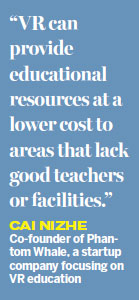Could VR teach children some valuable lessons?
When Zhong Qiu first tried a virtual reality game in early 2016, she was impressed and inspired by the technology: "It could solve a lot of problems if it could be applied to a simulation of laboratory class!"
At that time, Zhong was a chemistry teacher at Beijing Royal School. During her five-year teaching career, she found it difficult to teach the preview class before turning students loose into the laboratory.
"It's hard to make students remember all the details of the experiment if they receive the information passively," says Zhong. "But I felt that VR could let students explore the subject proactively on their own."
Now Zhong works for Phantom Whale, a startup company focusing on VR education.
"After my VR experience, I learned by chance that the company was hiring, and decided to give it a try," says Zhong. She designs content for a chemistry class that will be taught in the VR education application the company is developing.
In the virtual laboratory environment created in the app, students can preview a particular experiment and learn all the proper procedures before doing them in a real lab. They can also conduct dangerous experiments that are often taught but never practiced in traditional teaching.

"We are planning to develop VR courses for all subjects in K-12 (from kindergarten to 12th grade) education," says Cai Nizhe, who co-founded the company in early 2016 with three friends.
The company now has a team of around 30 employees and plans to hire more young teachers like Zhong with a strong background in teaching and a sense for the new technology.
Cai worked for UNICEF when she was studying at New York University and later worked for the Ministry of Health on policies to promote children's health and education equality in the country.
"VR can provide educational resources at a lower cost to areas that lack good teachers or facilities," says Cai.
"It can also broaden the horizons of students in rural areas by bringing them to other places in the world virtually."
The company has also applied its VR technology to vocational education on navigation and logistics through a partnership with the Guilin University of Electronic Technology.
"In the past, a complete navigation simulator cost millions, but now a VR device designed for the same purpose costs only tens of thousands," adds Cai.
Phantom Whale is not the only company eyeing the VR education market, which Goldman Sachs predicts will have 15 million users in 2025. A market that size would generate $700 million in revenue just from the educational software.
In the past year, more than a dozen companies have announced their own initiatives in the field in China, including the Nasdaq-listed New Oriental Education & Technology Group, which launched its VR English class through the online video platform of LeTV in August.
Alvin Wang Graylin is the China regional president of Vive, the VR branch of the Taiwan-based smartphone company HTC. In an interview with the People's Daily website in December, he said that although entertainment content is still what fuels the rapid growth of the VR industry now, education will be the major growth-driver in the long term.
"Parents won't spend some 6,000 yuan ($880; 822 euros; 703) on a VR headset for their children to play video games, but if you tell them that, through VR, their children could attend classes given by the best teachers in the best schools and universities in the world, they will probably buy it," said Graylin.


















